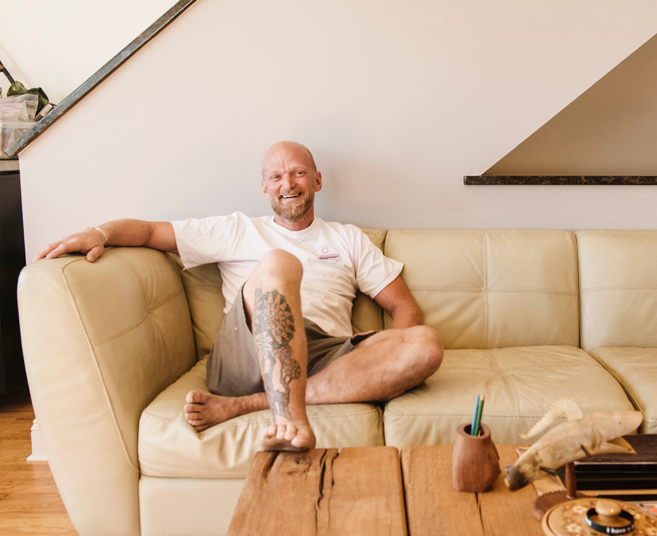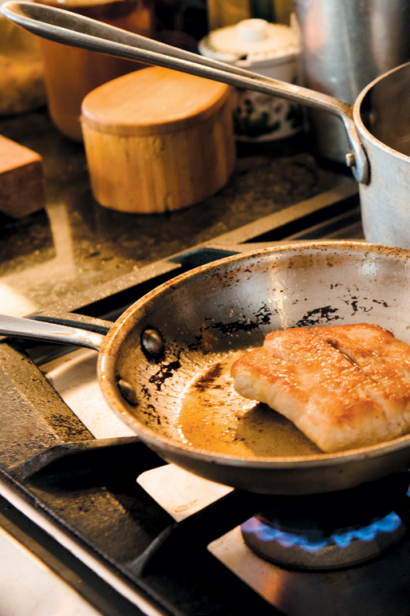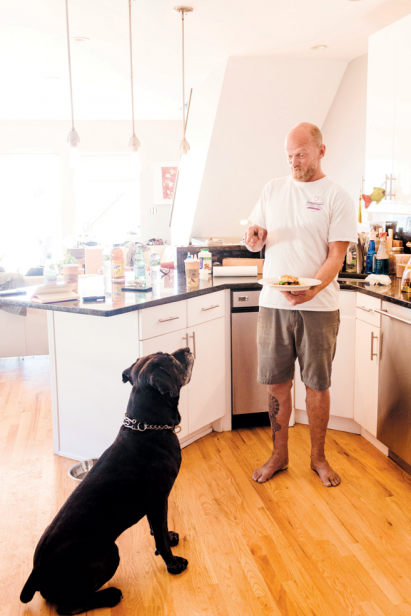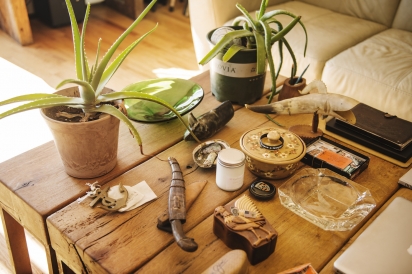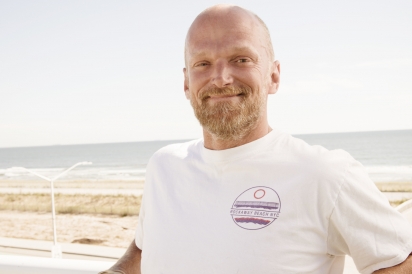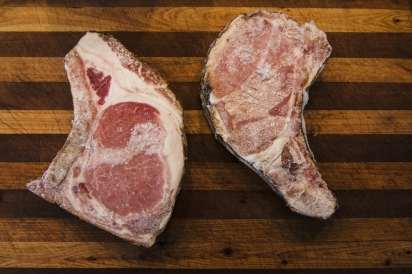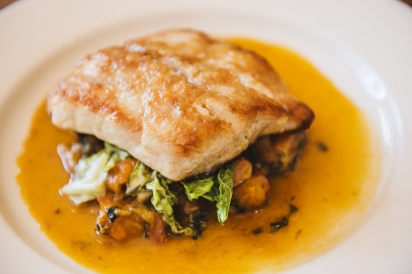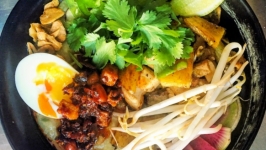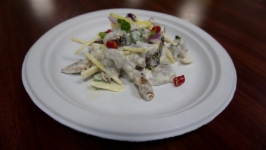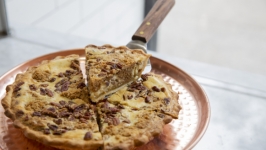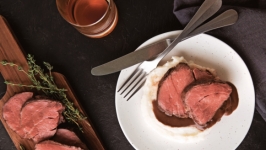Chef Whitney Aycock Talks Shark Tales and New Rockaway Restaurants
Whitney Aycock’s reputation for kerfuffles with squares, fun-killers and the law precedes him, by at least a block or five. It’s unclear when exactly the restaurateur and chef behind Rockaway’s now-shuttered Whit’s End was unceremoniously dubbed the “Pizza Nazi,” but the name has stuck.
Is Aycock the razzmatazz curmudgeon he’s made out to be? Sure, he admits (with a chuckle and a hoot) to sawing into the wall of his former restaurant to retrieve his pizza oven after a run-in with the police and a soured relationship with next-door landlord, Playland Motel. He can barely spit out a sentence without peppering it with at least one f-bomb. He proudly proclaims his love for “trap-rap” and profanity-laden tunes (the kind he likes to pump up at his restaurants) and he generally says whatever crosses his mind. If it sticks in your craw, he really can’t be bothered.
And yet, the second-generation chef’s employees, neighbors and entourage speak of him fondly; he may be eccentric, they say, but he’s a sturdy, well-paying captain with strong vision, and he makes a damn fine burger and bluefish dip, to say nothing of his wood-fired pies.
With plans to open two new projects this winter—a takeaway spot (to appease those sons of guns who just can’t understand the atmosphere Aycock is going for inside his restaurants) and a reiteration of the original Whit’s End, we caught up with the freewheeling shark slayer in his Beach 101st second-floor apartment to talk about comebacks: rebuilding after Hurricane Sandy, starting over with new ventures in his neighborhood and how he came back to pizza after over a decade-long hiatus.
Just don’t tell Aycock what to do, don’t complain about his music and don’t ask him for a slice, and you’ll get along just fine.
JAMAICAN ROOTS AND SOUTHERN KITCHENS
I was born in Atlanta, and my father lived in Jamaica. They had me and moved back [to Jamaica]. I lived there until I was 9, lived in Savannah for a couple years and then the Outer Banks. My dad was from Tennessee and a big farming family. He had an older brother who’d already taken over the family farm, so he moved to Jamaica. My mom was a stewardess; she met my dad at a PanAm Club in Miami.
She was 21, and my dad was, like, 64. My mom was hip and worldly and he was too, but more old school. I used to have dinner with my mom and dad every day as a kid. We talked and had no TV. My dad was a chef at restaurants in Jamaica, but it was the dinner parties [I remember]. There was always that laughter and cool conversation.
DISHES AS MEMORIES
On a hot summer day; chicken tonnato—not veal tonnato—and french fries, arugula salad. Back porch, slow-moving fan—I can totally see it—carpenter bees trying to bore holes into the [wood] … You could smell rosemary every time the wind would blow.
SHARK TALES
I had a boat when I was, like, 9—great f*cking shark fisher right here. Great whites, mako and thresher sharks are the kind that are big here. I catch them with a really good rod and reel; I like the challenge and sport of it. I end up cooking everything I catch.
ROCKAWAY IS A SMALL TOWN IN THE BIG CITY
I always had the skill of being able to cook. I moved to New York for something bigger than me, early 2000s. I got tired of living in the city and kept moving farther out. Some people can handle it, some people can’t. Because it’s like a small town in the city; you have that magnetism—people coming and going and that summer vibe. Here it’s easy.
COMMUNITY HAPPENS ON THE BOARDWALK
That boardwalk is key to socializing. And when that ends, I don’t know what to do for a while. All the concessions go, and the weather changes—less involved interactions on the boardwalk. For me, my dog in the morning on the boardwalk? That’s every day. Coffee, breakfast sandwich, dog interacting, hanging out together.
HOW HURRICANE SANDY WASHED AWAY RIVALRIES
There was no power for three months. I’d go fishing every day because I was brain-f*cked and the fishing was insane. There’s nothing more vivacious than having to survive. I’d never before experienced that. It’s f*cked up, though.
But it washed away a lot of old sh*t and some new sh*t can kind of happen. And even in that staunch thing of neighborhood sh*t—like, certain people wouldn’t cross a certain line to hang out downtown or uptown? It kind of washed that away, which was pretty cool. Good sh*t comes out of bad sh*t no matter what, you know. I feel that after Sandy it allowed other things to happen.
BECOMING A RESTAURANT OWNER
I didn’t think I’d ever do pizza again. Because I never did pizza except when I went to Italy. And that was only for a short stint, years ago, and I came back and never did it again. [But] I really wanted to do something open flame. Not barbecuing, but I wanted to use wood and create fire and I didn’t want to have gas appliances. I just wanted to have one thing to make everything out of—and it was a pizza oven.
A friend of mine was one of the first guys to be the importer for an oven manufacturer in Italy [Stefano Ferrara]. And a small place had ordered an oven; it was already being shipped over. They went out of business before they even opened. He called me and was, like, ‘You want this f*cking oven for pennies?’
I wanted a small place, to be able to touch everything. I had no money when I opened Whit’s End, but I made it work by sleeping there, working there, cleaning up, starting it, closing it down. I didn’t want to be for everybody, that’s why I don’t do slices. No matter how much hard work it was, it was always about having fun. You eat f*cking pizza or whatever I’m serving. You have a good time, you drink affordable beer, you drink great wine and you hang out.
This interview has been condensed and edited for length and clarity.


